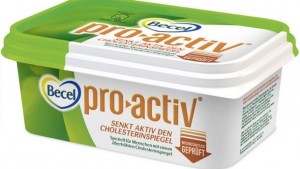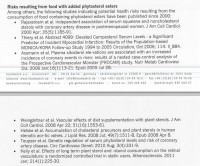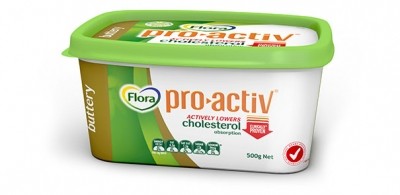Unilever wins right to say pro.activ cholesterol spread doesn't cause side effects

The Higher Regional Court in Hamburg ruled that Unilever did have the right to claim that from a scientific perspective there was no evidence of side effects from its plant sterol product.
FoodWatch said such marketing suppressed scientific evidence that the spread caused side effects like bloodstream plaque levels when consumed by healthy people – concerns echoed by the German Federal Institute for Risk Assessment (BfR).
Merlin Koene, communications director for Unilever D-A-CH, told NutraIngredients the ruling meant it could communicate in a “normal and scientific” way without emotions, which he said FoodWatch was trying to bring in.
The pair has been battling the issue out since 2011 with court proceedings beginning in 2012 when Unilever quoted food scientists Dr Hans-Ulrich Klör and Dr Eberhard Windler in a press release as saying there was no evidence of side effects.
FoodWatch told us it was now reviewing this week’s court decision carefully before addressing the Federal High Court of Justice (Bundesgerichtshof).
Yet Koene said it was highly unlikely the case would be accepted on a federal level since it had already been appealed and rejected twice.
The latest court decision was delivered on 1st September. The day before FoodWatch wrote an open letter to the European Commission’s directorate general for health and food safety, Vytenis Andriukaitis, asking that market approval be revoked for all ‘yellow fat spreads with added phytosterol esters’ like Unilever’s.
Koene called the letter a “PR stunt”.
“The timing of the release [of the letter] shows it is nothing but a PR diversion to direct attention away from the fact that they lost the case. They could have done it months ago.”
The Commission granted market permission to products with added phytosterol esters back in 2000.
In its letter to the Commissioner, FoodWatch said the approval should be retracted due a number of studies that suggested potential cardiovascular problems may be linked to overconsumption of sterol margarines, milks and breads by children and others who did not have raised cholesterol levels.
FoodWatch said the ‘precautionary principle’ – a foundation of EU food law – must be upheld in this case.
European Food Safety Authority (EFSA) approved cholesterol-reducing claims on such products back in 2009 – but the claim was refined last year so that products sold in the EU had to warn that they were not suitable for healthy people.
Yet FoodWatch said this was not enough and has campaigned in the past for such products to be classified as a drug.
A spokesperson told us: “It’s a fact that there are many studies on potential side effects of products such as Becel. Therefore we do not think a small warning on the backside of a package is enough. If there is doubt about the safety of a product it should not be sold in the supermarket!”
The global market for sterol-stanol based products is worth an estimated €2.5bn.























